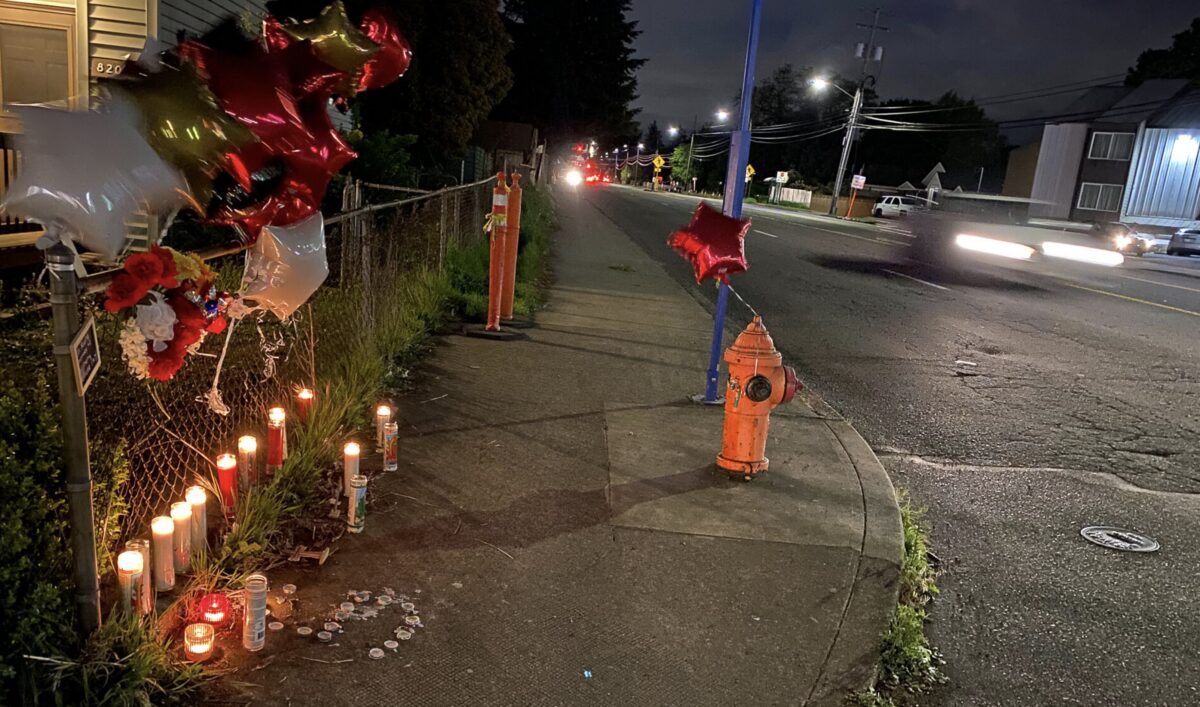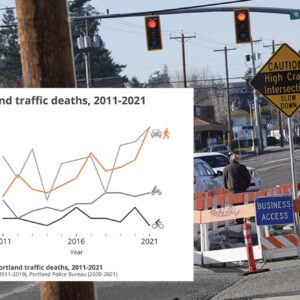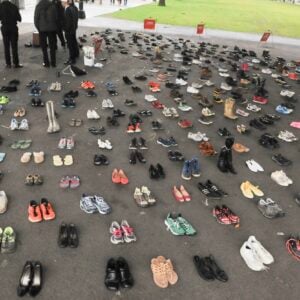Once again we are at the end of a year and once again I’m faced with the intense anger and frustration at another spate of road deaths. Four people have died while using Portland roads in the last seven days. Just since this past Thursday, three people were killed after being hit by a driver while walking.
According a statement by the Portland Police Bureau, the number of pedestrians killed on our roads has reached a 70-year high. (For some reason our tracker shows a much lower number than the PPB. I’m still working to figure out why.) So far this year they say we’ve had 66 total deaths, just one less than last year which was a 35-year high. Their numbers put the current toll of people killed while walking at 31 — a number we haven’t reached since 1952.
In 2021, the Portland Bureau of Transportation said the death toll was “devastating.” In 2020, they said the toll was “unusual” and “new and unexpected.” Now it feels like we’ve reached a new normal. It’s no longer possible for PBOT to excuse this rise in deaths as a fluke. Our collective inability to meet the challenge and respond to this crisis in a way that’s commensurate with its underlying causes is damning. If we want to end this madness, we must care about this issue — and the people who are dying — enough to act differently.
The PPB seems to care. But do their actions and policy choices reflect that?
“Despite advances in technology, infrastructure, education and awareness,” the PPB said, “We are still not solving the problem. And our traffic fatalities are at epidemic levels.” I’m glad the PPB used the word epidemic. Language matters, and advocates and policymakers should hold them and other agencies accountable to respond accordingly.
But “advances”? Really? If we’d truly made advances on those fronts, I wouldn’t be writing this piece.
Let’s take each “advance” the PPB says we’ve made.
Technology: I’m really curious what technology they’re referring to here. With obscenely large screens and so much illegal phone use, cars have more high-tech distractions in them than ever. That’s not an advance, that’s a red flag. Almost every piece of car technology benefits only drivers and their occupants. Is the PPB referring to smarter traffic signals perhaps? Those are no match for selfish, scofflaw drivers who ignore anything that gets in their way. Maybe police have better technology to track down speeders? That only matters when they actually use it. Take automated traffic cameras: Despite finally passing a law early this year (after PPB fought against it) that lets civilians take the place of police officers in the processing of citations, PBOT has not installed a single automated enforcement camera since fall 2021. Cameras are perhaps the single most effective piece of technology we have to battle unsafe roads and PBOT has so far failed to deliver on it. Since launching the program in 2016, there are only five intersections citywide that are monitored with speed cameras.
Infrastructure: Yes we are busy with road projects, but work itself isn’t progress. Time and time again we’ve made decisions on road designs based on what makes politics safe, not what makes people safe. Our infrastructure is still way too imbalanced because PBOT and ODOT and too many Portlanders are reluctant to change the status quo. Why? Because they are afraid to make it less convenient to drive everywhere all the time. Similar to how some Portlanders say they care about affordable housing but fight new apartments in their neighborhood; far too many people in this town say they care about safe streets only to oppose changes that would make them possible.
Far too many of Portland’s powerful policymakers are incrementalists who talk a big game but shirk in the moments that matter. Like I wrote two years ago, we will never have safe streets if we continue to make safe choices.
Education and awareness: Just about a year ago, the PPB held a press conference to talk about the high number of traffic fatalities. A traffic division sargeant told the assembled media outlets that staffing levels at PPB are so low, “They had to dismantle the almost the entire traffic division.” The sargeant went on to educate the public that he was the only full-time motorcycle officer in the entire bureau and that, “All the other motorcycle officers and car officers were sent back to the precincts…And they do not have enough people to help them out to patrol your streets.” This was part of an ongoing campaign to set a narrative that results in PPB getting more funding and more officers. True or not, it is based on a political goal, not a safety goal — not to mention how absurd it is for the police to tell the public they won’t be punished for breaking traffic laws, and then blame the public for deaths and injuries caused by people breaking traffic laws.
Local media also plays a role in education. But far too often they act more like an arm of the PPB public relations firm than actual journalists. A story that aired Monday on KOIN was framed entirely on how the record number of road deaths was related to low police staffing levels. No evidence for that correlation was shared, but the misleading story did include an interview from the leader of the police officer union who assured viewers that more people have died because they don’t have enough officers on the streets.
We’re also coming to the end of two years where the director of PBOT (Jo Ann Hardesty) and the PPB were often at odds. Did the public get a fair shot at productive collaboration on this complicated issue between these two important entities when they were tangled in a messy lawsuit?
To push back against this tide of tragic traffic deaths, we must move beyond the normal state of affairs. We must care. We have to truly care about the problem in order to make real progress. We also must care about the people impacted by these crashes enough to be inspired to do something about it.
I can’t shake the feeling that if it were someone other than “pedestrians” and/or people who live on the street who were being killed at record numbers, we might see a different response. Our society is at an all-time high of hate and othering. I feel like the lack of care for others on the road — and its often deadly consequences — is related to that.
Here’s a thought exercise: What if we had a record number of city or state work crew members killed in traffic crashes? What if this tragic record belonged to police officers themselves? Or powerful downtown business owners? Would we respond differently if those type of people were being killed?
Something needs to change. Instead of pointing fingers or playing politics, we need to look in the mirror. Progress will only come when we care about the people outside our cars as much as those inside them, and then create policy and projects accordingly.








Thanks for reading.
BikePortland has served this community with independent community journalism since 2005. We rely on subscriptions from readers like you to survive. Your financial support is vital in keeping this valuable resource alive and well.
Please subscribe today to strengthen and expand our work.
Cops can hand out all the tickets they want, but when the courts are crammed, and jails are full, and public doesn’t want to pay to fix it, well……
Activists complained that too many of the wrong people were getting tickets, and rather than addressing the problem by encouraging folks to drive legally, we stopped enforcing traffic laws.
Now more people are dying. Right problem, wrong solution.
You think the solution to “too many people of the wrong people were getting tickets” is encouraging folks to drive legally?
I do, for 2 reasons: First, there is no evidence people were getting tickets without breaking the law, and second, the stats show the activists were wrong.
But if the answer to too many tickets isn’t to drive more safely, what is it?
I’m fine with enforcing traffic laws and would love to see more passive traffic enforcement like speed cameras.
I don’t see any reason to believe that police can meaningfully drive down road deaths. Lousiana and Kentucky have a ton of cops and a much higher fatality rate than we do.
I’m not sure we’re comparable to LA and KY, but regardless, do you find our default driving behavior so acceptable you see no reason to enforce the rules? Does that really make us better off?
It’s interesting how do many otherwise progressive people have become libertarian on the question of driving safety.
Unfortunately even before the blue flu, the chances of being caught while (driving drunk, speeding, driving dangerously etc.) were so low that most people didn’t believe they would be caught – so they don’t change behavior.
Red light cameras (where the timing on the lights isn’t changed to generate revenue) and speed cameras *always* catch you and they change behavior in most people.
Making the utterly ubiquitous would save a lot of lives, but is both expensive and will be fought tooth and nail based on the so called “right to privacy” (while using publicly paid for infrastructure – go figure).
Cameras could easily be made compatible with privacy with the right legal framework. Simply prohibit collection and retention of any data not needed to issue a ticket.
Until cameras are ubiquitous, and can detect drunk driving and other dangerous driving, we will need a both/and approach rather than an either/or.
Or we could just accept our increased level of deaths and injuries as the cost of a more tolerant approach to traffic law.
they’re also Louisiana and Kentucky.
I think you would enjoy Confessions of a Recovering Engineer by Charles Marohn. There is a better solution, and it isn’t traffic tickets. It’s called traffic calming, and it is installation of actual infrastructure so that it feels unsafe to go fast. It’s cheap, low maintenance, and doesn’t punish the poor.
Yes, let’s install traffic calming. No one solution is going to fix this problem. We need traffic tickets and traffic calming.
If “the poor” don’t want tickets, they should obey the law. It’s really not that hard, and it is astounding to me that that statement is at all controversial on this forum.
I completely agree. The idea that we can solve this issue purely with traffic calming is just not true. An intoxicated or distracted driver can easily hop over curbs, through diverters, over speed bumps at high speed, etc. Traffic calming does a ton of good and helps the issue, but only partially. Enforcement is needed for the truly egregious drivers out there. And speed cameras are fair and neutral–as Watts says, you don’t get a ticket unless you break the law, and the camera doesn’t care who you are and what your background is. And keep in mind you don’t even get a ticket unless you go 10 mph or more over the limit, so it really is targeting egregious behavior.
Police out here in NC, and probably in Portland too, regularly go through security camera footage from local businesses and residents near crashes, also dash cams and cell phone cams when volunteers make them available – and the cameras are improving, getting less grainy and much sharper in identifying people, cars, and licenses – to the point that red light and speed cameras are, well, a bit dated.
I’m not following that. If you’re saying those other cameras have better resolution than red light and speeding cameras, maybe that’s true. But otherwise,
red light and speed cameras are used to catch people running red lights and speeding, and to discourage those activities by their presence, while those other cameras typically have no relevance to those purposes.
Does the number of pedestrian and bike fatalities reflect a pattern of dangerous driving, even though your death rate from such fatalities isn’t particularly high? Or is it a reflection on how bike and pedestrian friendly the city is that so many people are willing to go out and walk and bike rather than get into their cars and drive across the street? I have to point out that the cities with the lowest bike a ped fatality rates are also some of the most boring to be in and have far fewer facilities than Portland does – they are simply unattractive places to bike and walk in.
David the vast majority of the pedestrians killed in Portland are homeless.
None of those things are mutually exclusive, David.
Jonathan, why are you afraid to publish the percentage of homeless that make up those killed? (It’s the majority). Shying away from the facts won’t help us reduce the death toll?
What? I link to an article about that in the story.
So far this year, the city has racked up over 90 homicides, something like two thirds of them in organized crime drug trafficking circles. The violent open air drug markets where many of these killings stem from have gone unchecked for years.
Meanwhile ,The Shroom House—a brick and mortar store selling fungus not generally blamed for dependence, poverty, or psychosis, much less violence—was shut down how quickly?
Under Vision Zero, if that is still city policy if only in name, casualties are trending away from that ideal number.
Maybe we’re like teenagers, bouncing from one fad to another. If the city is genuinely interested in its stated goals it has a very hard time ealking the walk. Perhaps the new charter will change some of this but I don’t expect it soon if at all: the charter itself could be the next shiny thing we pick up and put down quickly.
We can only hope that city leadership and administration find some of that religion for themselves until then. Hundreds of lives are measurably at state.
The Shroom House made it so easy for the cops. They were basically daring them to enforce the law. The low-level “open air” markets are significantly more dangerous, and messy, to deal with.
I think you’re misunderstanding the city charter update: it is NOT a fad – it is a permanent change in the structure of city gov’t that will put permanent employees into new positions and ensure that operational focus can be maintained in ways it currently is not. It’s just not possible to maintain continuity when a mayor gets mad at a councilor and gives her/his bureau to some other councilor. That won’t be happening under the new charter.
I’m not saying everything will be perfect under the new charter, but we have a much better chance of improvement b/c the adults will be in charge.
Charter reform is a patch of green grass on the other side of a tall fence that will look much less tasty when the gate is opened.
Mayors don’t reassign bureaus because they get mad, and every bureau already has a manager that runs the day-to-day. All that’s going to change is that the bureaus will be more insulated from the people they are supposed to serve, and city council will be more entertaining to watch.
What we have now isn’t working for the same reasons what we will have won’t work — difficult problems with politically unpopular solutions (if they exist at all).
Portland dissolved its vision zero task force . Vision zero is just another “plan” full of empty and unfunded promises relegated to the dusty bookshelves of PBOT’s sub-basement of failure.
https://www.koin.com/local/multnomah-county/city-of-portland-dissolves-vision-zero-task-force/
RE: “Progress will only come when we care about the people outside our cars as much as those inside them, and then create policy and projects [
projects] accordingly.”Thanks for writing this article, Jonathan. I agree! I’ve been rambling throughout the metro region on foot for the past 12 years. Based on the 1000s of intersections I’ve crossed, my gut sense is that it’s more dangerous now than ever. And for the record, I’m always vigilant at intersection crossings and make sure I’m visible. Even so, to use a current example, after I met you at the Pitch and Bitch session and walked to catch my bus, I encountered awful, in-a-hurry motorists when I was crossing N Williams.
My unsolicited advice to some of those who can help reduce our regional pedestrian deaths follows.
To regional public policymakers and traffic engineers: Take (make) time to explore our region on foot. Live the experience. Go out on dark and rainy days, get out of your neighborhood, leave your staffers behind, and don’t do a photo-op at the end.
To PPB: Walk a beat, now and then. I know this is a simplistic view given the number of streets we have in our region, your resource shortages, and our increase in crime. Whenever I interact with the officers who are on foot (or bicycles), however, I tend to think they have a unique “in the streets” perspective that an officer just can’t get from inside a vehicle.
The following is an excerpt from a note that I sent to Jonathan in July 2020. It ties in with my last comments.
As a boy growing up in rural Alaska, I fondly remember reading about the Bobbies in London with their short sticks and whistles. Note Sir Robert Peel’s founding principles in this Wikipedia (yes, not scholarly) article – https://en.wikipedia.org/wiki/Law_enforcement_in_the_United_Kingdom. What are PPB’s/PPA’s Principles?
It’s hard to care for those who don’t appear to care whether they live or die themselves. I know that I would be careless with my life if I felt no one cared about me.
As a driver and cyclist I have saved myself many times from being involved in collisions by paying attention and leaving plenty of space between me and others. I have also been spared collisions many times by people who were paying attention when I made errors in driving/cycling. All it takes is two people not paying attention for a collision to occur. Is it any wonder that they do? Now add in people who may not care or would rather be dead. This goes a lot deeper than traffic laws and road design.
Thanks for caring!
This reads as ill-informed othering on a steaming bed of cognitive dissonance.
I really hope your luck does not run out.
Certainly not Leah Treat nor Leah Sahum.
Why don’t we look at this on a per capita or VMT basis. Hitting a record from 1950 when the population was 373,000 suggests a per capita rate of .177 per thousand residents (66 road deaths), vs today with a population of 641,000 suggests a per capita rate of .10 per thousand residents, so a significant improvement over the 1950s and an improvement over 1990s as well.
Additionally, do we know how many of these deaths resulted in traffic citations on the drivers? Is the assumption that enforcement would help based on that or just hope that that would improve something?